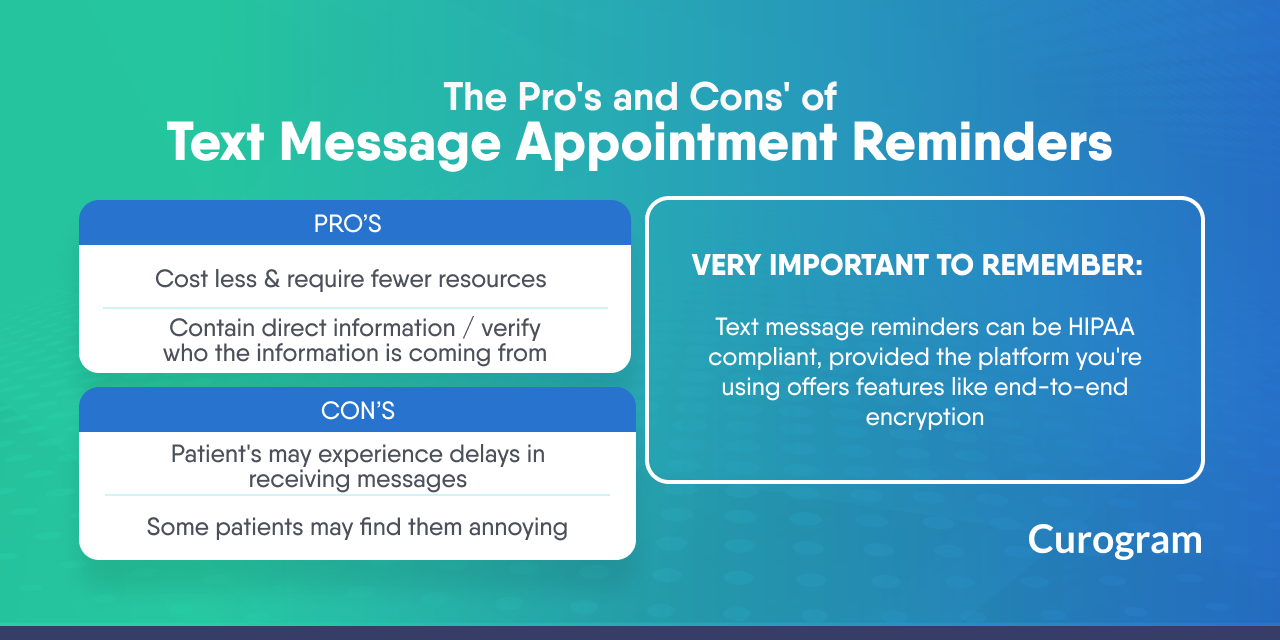Texting Simplifies Appointments, Scheduling, and Communication
Text messaging (SMS) is one of the most sought-after telemedicine features. It simplifies the appointment making process, both virtually and in...
3 min read
 Carylee Gali
:
11/23/22 3:23 PM
Carylee Gali
:
11/23/22 3:23 PM

One of the main reasons patients miss their appointments is they simply forget. That is why appointment reminders are essential. Reminders not only tickle the patient’s memory but also helps them to stay organized. A reminder system makes it easy for your patients to keep their bookings. It also reduces admin tasks and boosts revenue.
Reminders also have their downsides. One major con is that some people may find them annoying. Not everyone wants to receive regular text notifications or voicemails from their doctor. Here are the pros and cons of text and voicemail appointment reminders that healthcare providers commonly use.
Pro: Cost Less and Requires Fewer Resources
For your medical practice, sending a text is cheaper and lowers the use of administrative resources. You can automatically send mass SMS, reducing labor costs that come with making phone calls to every patient.
Pro: Convenient and Direct
Patients prefer receiving notifications via SMS because it is more convenient, direct to the point, and isn’t intrusive. More importantly, patients are more likely to see an SMS reminder because most people open a text message within a few minutes of receiving it.
With a 2-way text messaging system, patients can reschedule their consultation by simply replying to the text. They can easily add appointment reminders to their calendar.
Additionally, the details about their consultation are always available for them to return to in case they forget, reducing no-shows.
Con: Patients May Experience Delays in Receiving Messages
One of the main issues in using SMS for appointment reminders is the delays in receiving text messages. Phone connection isn’t always reliable. There’s always a possibility of weak network reception, resulting in delayed messages.
Con: Patients May Treat as Spam
Unlike an email, an SMS does not contain a company branding or logo, which may appear suspicious, especially for new patients.
Thus, patients may consider such as malicious or spammy and ignore them.
Other disadvantages of using SMS as an appointment reminder include the following:
Moreover, some patients are unwilling to disclose their mobile numbers or authorize you to text them; in this case, you must ask them their preferred appointment reminder setup, such as a land-line or voicemail message.
Pro: Contain Direct Information
Perhaps the main advantages of a voicemail appointment reminder are that it contains accurate content and shows that the call is directly from a physician’s clinic or office. Reminding your staff to include the clinic’s and attending physician’s names when leaving a voicemail is essential.
Pro: Can Convey More Information
Voicemails allow for more in-depth communications. It’s easier to relay a lot more information in a voicemail than in a text, such as details of personalized services.
Con: Some Patients May Find Them Annoying
Voicemail reminders can be problematic for patients who do not like taking or receiving calls on their mobile phones. Also, some people do not check their voicemails immediately, or their mailbox is full, leading to unreceived voicemail messages.
Do not adopt voicemail reminders into your medical practice straightaway; ask your patients if they prefer this kind of communication. That is because some people consider voicemail messages to be a nuisance. Listening to them can be time-consuming, and they would instead use their time doing more important and urgent tasks.
Con: Not HIPAA Compliant
If you want to avoid violating HIPAA regulations, it’s safer to use text appointment reminders on a HIPAA-compliant platform. Voicemail, on the other hand, is not HIPAA compliant by default. You can’t use voicemail reminders to communicate protected health information (PHI) unless you sign a business associate agreement (BAA) with the phone service provider. Otherwise, you must avoid mentioning PHI in your message, which can be troublesome because of its difficulty.
|
|
Pros |
Cons |
|
Text |
Cost less and requires fewer resources |
Patients may experience delays in receiving messages |
|
|
Convenient and direct |
Patients may treat as spam |
|
Voicemail |
Contain direct information |
Some patients may find them annoying |
|
|
Can convey more information |
Not HIPAA compliant by default |
The truth is, you can send and receive five times more text messages than make and receive calls. So, if you want to increase your communication efficiency and lower administrative costs, you should find a HIPAA-compliant text messaging solution for your appointment reminders. To be HIPAA-complaint with appointment reminders, you should opt for a healthcare-specific platform like Curogram that secures all data sent over SMS. It can take your texting capabilities to the next level and help you automate many tedious tasks.


Text messaging (SMS) is one of the most sought-after telemedicine features. It simplifies the appointment making process, both virtually and in...

According to a report, 94% of physicians are smartphone users. In addition to making phone calls and using apps, physicians and other medical staff...

Enhanced patient communication makes a difference in providing good healthcare and excellent healthcare. That is why more medical practices leverage...